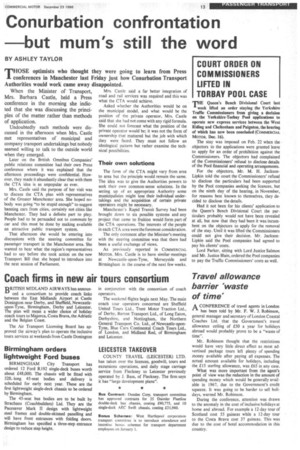Conurbation confrontation but mum's still the word
Page 15

If you've noticed an error in this article please click here to report it so we can fix it.
BY ASHLEY TAYLOR THOSE optimists who thought they were going to learn from Press conferences in Manchester last Friday just how Conurbation Transport Authorities would work came away disappointed.
When the Minister or Transport, Mrs. Barbara Castle, held a Press conference in the morning she indicted that she was discussing the principles of the matter rather than methods of application.
Undoubtedly such methods were discussed in the afternoon when Mrs. Castle met representatives of municipal and company transport undertakings but nobody seemed willing to talk to the outside world when they emerged.
Later on the British Omnibus Companies' public relations committee had their own Press conference where it was explained that the afternoon proceedings were confidential. However, they made it abundantly clear that with them the CTA idea is as unpopular as ever.
Mrs. Castle said the purpose of her visit was to discuss the CTA plan with representatives of the Greater Manchester area. She hoped nobody was going "to be stupid enough" to suggest banning cars from cities, certainly not cities like Manchester. They had a definite part to play. People had to be persuaded not to commute by car and this must be done by making available an attractive public transport system.
That afternoon she would be entering into discussions with the steering committee for passenger transport in the Manchester area. She wanted to hear what the region's representatives had to say before she took action on the new Transport Bill that she hoped to introduce into the next session of Parliament.
Mrs. Castle said a far better integration of road and rail services was required and this was what the CTA would achieve.
Asked whether the Authorities would be on the municipal model, and what would be the position of the private operator, Mrs. Castle said that she had not come with any rigid formula. She could not forecast what the position of the private operator would be; it was not the form of ownership that mattered but the job with which they were faced. They must not follow an ideological pattern but rather examine the technical possibilities.
Their own solutions The form of the CTA might vary from area to area but the principle would remain the same. The idea was to give the Authorities powers to seek their own common-sense solutions. In the setting up of an appropriate Authority some municipalieies might lose their individual undertakings and the acquisition of certain private operators might be necessary.
Manchester's Rapid Transit Survey had been brought down to six possible systems and any project that came to fruition would form part of the CTA operations. The interests of the people in each CTA area were the foremost consideration.
The only comment after the Minister's meeting with the steering committee was that there had been a useful exchange of views.
As previously reported in COMMERCIAL MOTOR, Mrs. Castle is to have similar meetings at Newcastle-upon-Tyne, Merseyside and Birmingham in the course of the next few weeks.












































































